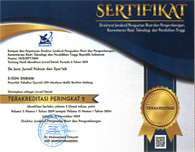KEWENANGAN KELEMBAGAAN NEGARA SETELAH PERUBAHAN UUD 1945
Abstract
Tujuan penelitian ini adalah menggambarkan secara sistematis hal-hal yang berkaitan dengan kewenangan kelembagaan negara setelah perubahan UUD 1945. Metode penelitiannya adalah penelitian hukum-normatif dengan menggunakan pendekatan konsep dan perundang-undangan. Hasil dari penelitian ini menyimpulkan bahwa adanya perubahan mendasar terkait dengan pola pembagian kekuasaan pada tiga cabang kekuasaan ; legislatif, eksekutif, dan yudikatif. Lembaga berwenang dalam pembuatan UU, lembaga eksekutif tetap dalam tugas pemerintahan dan lembaga yudisial telah memperkuat fungsi dan peranannya di bidang peradilan dengan membentuk institusi baru yaitu Mahkamah Konstitusi. Lembaga ini mempunyai kewenangan melakukan uji materi (judicial review) UU atas UUD, yang sebelumnya menjadi tugas dari MA.
The objective of this research is to systematically describe aspects relating to the authority of state instrumentalities after the amandment of UUD 1945. The method of this research is normative- legal research using conceptual legislation approaches. The result reveals a fundamental changing on authority distribution pattern within three authority branches: legislative, executive and judicative. The legislative body of the state holds an authority to dispense regulations, while the executive body is responsible for running the governance, and the judicial body strengthens its function and its role in court system and possesses authority to form new institution namely Constitutional Court. This institution has the authority to undertake judicial review on the Constitution which is used to be the responsibility of Supreme Court.
Kata Kunci: Kewenangan Kelembagaan Negara, Perubahan UUD 1945
The objective of this research is to systematically describe aspects relating to the authority of state instrumentalities after the amandment of UUD 1945. The method of this research is normative- legal research using conceptual legislation approaches. The result reveals a fundamental changing on authority distribution pattern within three authority branches: legislative, executive and judicative. The legislative body of the state holds an authority to dispense regulations, while the executive body is responsible for running the governance, and the judicial body strengthens its function and its role in court system and possesses authority to form new institution namely Constitutional Court. This institution has the authority to undertake judicial review on the Constitution which is used to be the responsibility of Supreme Court.
Kata Kunci: Kewenangan Kelembagaan Negara, Perubahan UUD 1945
Keywords
Syariah; Hukum Perdata Islam; Kewenangan Kelembagaan Negara; Perubahan UUD 1945
DOI: https://doi.org/10.18860/j-fsh.v2i1.45
Copyright (c) 2011 Jundiani Jundiani
Published By:
Shariah Faculty Universitas Islam Negeri Maulana Malik Ibrahim MalangGajayana Street 50 Malang, East Java, Indonesia
De Jure: Jurnal Hukum dan Syar'iah is licensed under a Creative Commons Attribution-ShareAlike 4.0 International







